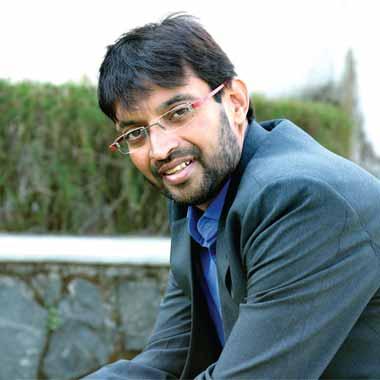Why Enaltec's CEO Believes Customer is King
- BY Sonal Khetarpal
 In Strategy
In Strategy 14362
14362 0
0

Anand Shah first joined Glenmark, a leading pharmaceutical brand, in 2001, to unravel the world of marketing. What he gained most though from the experience was a profitable chemistry with his colleagues, Dr Sivakumar and Susheel Koul. Soon, the trio developed the formulation of a new business—Enaltec Labs—which they co-founded in Mumbai in 2006 to develop and produce complex, technologically challenging APIs (the substance used in manufacturing a drug). For Shah, the most rewarding aspect of building the Rs70-crore plus business has been forging personal ties with customers and employees. He also credits his success to his ability to focus on the present, and always having a notebook to jot ideas on.
I get up at 6am every day. It has become a habit now. Three days a week, I play tennis for an hour and a half in my building compound with a regular group of tennis players. On other days, I go out for biking instead. Some days, I don’t work out at all in the morning, and go to the gym in the evening for weight training. On these days, I utilise my morning to read newspapers leisurely. As I get ready and have my breakfast, I find time to glance through my Inbox. It gives me a gist of what has been happening at our customer’s end. Whatever it is that I do—at home or in office—my “switch on-switch off” philoshopy permeates it. I always focus on the activity in hand and switch off my mind from the rest of the world.
Just as I split my exercise regime into tennis, gym and biking, I also divide my work week between our corporate office, factory and the R&D centre. I spend three days in the corporate office and the rest in the factory or the R&D centre. Both places are less than half-an-hour- drives from my home. I aim to reach whichever workplace I’m going to that day by 9.30am. The offices start filling up only by 10am so I usually keep the first hour for myself—mainly, to reply to e-mails as I drink my morning cup of coffee. It’s good to get this hour to myself because the rest of the day is lined up with meetings with different departments. We have 15 people in the core decision-making committee of the company, and everybody in this group is equally involved in setting the strategic long term direction, not just promoters.
A lot of marketing executives prefer to communicate with customers through technology—via e-mails or videoconferencing. I believe in meeting them personally."
- Anand Shah
I am involved in every activity even though we have some very competent department heads. Most of my work is to give targets to each department, motivate them to achieve the set objectives, and provide feedback thereafter. I do not get engaged with the operational aspects and leave it to the respective managers. It is the skill of following up that helps me play this role with ease. For better recall, I use the Reminder App in my MacBook that is also synced with my phone. After every meeting or discussion, I duly update the calendar.
I also have the habit of jotting down notes. In fact, I think it’s my most effective habit as a manager. There is always a notepad on my table which I refer to frequently. I never tear out pages from it so that I can flip back and refer to my notes from previous days. One cannot rely on his or her memory. It is impossible. These notes help me follow up and I encourage my team members to bring a notepad even when we’re having a casual discussion. You never know when a great idea may strike.
Apart from being the MD and CEO, I am also the marketing head for international markets. We cater to more than 30 countries across the globe. We target easy entry markets like India, Bangladesh and Pakistan; semi-regulated markets like Argentina, Brazil, Turkey, South Korea and regulated markets like Europe and the US. I handle clients from the US, Europe and South America myself. We are also foraying into Russia and France now. We have general managers (International Marketing) to handle different countries. Almost 80 per cent of our turnover comes from our exports.
 Volleying Well: For Shah, playing tennis with his colleagues is a good way to connect with them.
Volleying Well: For Shah, playing tennis with his colleagues is a good way to connect with them. We set aside eight per cent of the company turnover for research and development of new products and processes. When a brand gets approved after undergoing clinical trials, Enaltec starts working on these products and creates intellectual property (IP) rights on them. We have two state-of-the-art manufacturing facilities in Ambernath and Nashik in Maharashtra. So far, we have developed and commercialised 30 products in various therapeutic segments like ophthalmology, cardiovascular disease, dermatology and CNS (central nervous system) and filed for more than 75 patents. The focus is to introduce new products in our existing markets, and also to add newer markets to help the company realise better value for its existing products. We are also looking at collaborating with finished dosage form companies to develop products up to the final stage. After all, our next three year agenda aims to have a 50 per cent growth rate by the year 2016.
For getting new customers and getting more business, the art of relationship building plays a very crucial role. Nowadays, a lot of marketing executives prefer to communicate with customers through technology—via e-mails or videoconferencing. I believe in meeting them personally. Even if I do not have any definite agenda, I will drop in to an existing or potential client’s office. It is important to educate a client with product information, its advantages over previous molecules in the same category and formulation know-how. Due to this, I travel a lot. I am usually on the move five to 15 days in a month. To potential customers, showing up regularly builds familiarity which might eventually lead to their trying out our APIs (active pharmaceutical ingredient). In the beginning, I try to get a small order from a new client. Only as they gain more confidence in our product do I try to pull off larger orders from them. For our current customers, the physical presence of a company’s representative gives them a sense of assurance and a chance to provide timely feedback which they might not have conveyed otherwise. This not only helps in getting repeat business but also results in new orders.
We do not judge people by the time they spend in office but on the basis of their performance. We are easily able to recognise hard work.
However, meeting customers is not enough. There are always challenges or difficult situations in any relationship. There is no way to avoid them. One has to live with it. A lot of these clients have come to our manufacturing unit for inspection and checking our resources. In the initial years, we were often treated with suspicion. They would push us around and ask a lot of questions. You just have to believe in your business model and be patient. In such cases, I try to build up their trust not only in myself but also in our team. It is the right approach that makes a lot of difference.
In fact, honesty in professional relationships plays a far greater role. I always tell my team—we are not the most perfect people in the world and let us not pretend to be so. It is better to accept that some thing is wrong. There have been several cases of material rejection, sometimes even when it was not our fault. My experience has taught me that the customer is always right. In such cases, I try to find the mutual ground, if possible. This approach has worked for us. Even though we are a young company, we supply to some of the big pharmaceutical companies of the world like Sun Pharma, Cipla, Micro labs and Mankind Pharma (in India); Chemwerth (in the US); Ache, EMS, Geolab and Eurofarma (in Brazil); Neutec and Abdi Ibrahim (in Turkey); and Roemmers and Gador (in Argentina). This shows their confidence in us and the onus is on us to always maintain their trust.
Developing camaraderie not only with customers but with one’s own employees is essential too. We are a small, young company. We have made sure to avoid strict hierarchical structures. The table tennis room in our office and the volleyball court in our R&D centre is a great socialising place. I often play there too. It is a good way to connect with colleagues. Often, taking a formal problem and discussing it in an informal setting makes great sense. So, we’ve consciously tried to keep a very casual work environment in the office. I have an open door policy and people can come in my office and talk to me any time. In fact, the way I work and deal with my employees has been greatly influenced by Mr Glenn Saldanha, chairman and MD of Glenmark. Though I wish I had more patience like him when I teach my employees. I always expect a reasonable skill set in the other person. This is a habit I’d like to change in myself.
We do not judge people by the time they spend in office but on the basis of their performance. As ours is a small company, we are easily able to recognise and acknowledge the hard work. We have a very organised system for short-term and long-term reviews for each department, whether it is HR, production, purchase or marketing, that evaluates each process and person thoroughly. As we have put the review system in place, we have realised our attrition rate has gone down tremendously. Initially, it was very difficult to get the right talent pool in the organisation and retain it. It is different now. I am proud that we have some very experienced people from the established pharmaceutical companies like Dr. Reddy’s Laboratories, Macleods and Ranbaxy. I might be the face of the company, but ultimately the company is formed by the people who work in it.
What disheartens me is when I see employees more concerned about their salary increment or the next promotion. These are short-term goals. An individual should work towards his or her life goals. My father always said that if you want to become successful, ask your boss to put more pressure on your head. That is when you will grow. This is how I started my career with marketing—with an ambition to get exposure to the world market. I don’t see success in monetary terms. Success is when your co-workers and the people in the industry start believing, recognising and respecting you.





























Add new comment